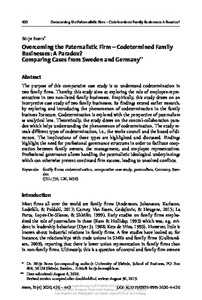Overcoming the paternalistic firm – codetermined family businesses: a paradox? Comparing cases from Sweden and Germany

2020
31
4
420-443
codetermination ; family enterprise ; comparison ; case study ; works council
Workers participation and European works councils
https://doi.org/10.5771/0935-9915-2020-4-420
English
Bibliogr.
"The purpose of this comparative case study is to understand codetermination in two family firms. Thereby, this study aims at exploring the role of employee-representatives in two non-listed family businesses. Empirically, this study draws on an interpretive case study of two family businesses. Its findings extend earlier research, by exploring and introducing the phenomenon of codetermination in the family business literature. Codetermination is explored with the perspective of paternalism as analytical lens. Theoretically, the study draws on the control-collaboration paradox which helps understanding the phenomenon of codetermination. The study reveals different types of codetermination, i.e., the works council and the board of directors. The implications of these types are highlighted and discussed. Findings highlight the need for professional governance structures in order to facilitate cooperation between family owners, the management, and employee representatives. Professional governance allows handling the paternalistic ideological underpinnings which can otherwise prevent continued firm success, leading to unsolved conflicts"
Digital
The ETUI is co-funded by the European Union. Views and opinions expressed are however those of the author(s) only and do not necessarily reflect those of the European Union or the ETUI.